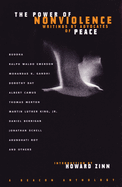 The sixteenth chapter of The Power of Nonviolence: Writings by Advocates of Peace contains Dr. Martin Luther King’s 1967 speech Declaration of Independence from the War in Vietnam. The speech, which is also known as Beyond Vietnam: A Time to Break Silence ,was given in the Manhattan’s Riverside Church exactly one year before King was assassinated. It is sad to realize that Dr. King’s 45 year old attempt to seek freedom from war applies equally to the Vietnam War as it does to the wars that the United States is now waging in Iraq, Afghanistan, Pakistan, and Yemen.
The sixteenth chapter of The Power of Nonviolence: Writings by Advocates of Peace contains Dr. Martin Luther King’s 1967 speech Declaration of Independence from the War in Vietnam. The speech, which is also known as Beyond Vietnam: A Time to Break Silence ,was given in the Manhattan’s Riverside Church exactly one year before King was assassinated. It is sad to realize that Dr. King’s 45 year old attempt to seek freedom from war applies equally to the Vietnam War as it does to the wars that the United States is now waging in Iraq, Afghanistan, Pakistan, and Yemen.
Through the lens of history, it is hard to understand how controversial the speech was in 1967. It is common wisdom today that the Vietnam War was a mistake, despite the US government’s recently started 10-year plan to rehabilitate American’s view of that war. In 1967, all the major media backed the Vietnam War. Dr. King was regularly attacked in national newspapers such as the New York Times for speaking out against the Vietnam War. Peace activists are still attacked in today’s media for opposing today’s wars for the same reasons that Dr. King cites.
Dr. King responds to his critics who say that he should only speak about the domestic issue of civil rights, and keep silent on the VietNam War. The critics make the lesser evil argument that Dr. King is hurting the cause of civil rights by speaking out against the war. Dr. Kings explains in the introduction of his speech that those critics misunderstand both who he is , and misunderstand”the world in which they live.” Dr. King gives seven reasons why he must speak out: Continue reading MLK: Declaration of Independence from the War


 #J15 Worldwide Candlelight Vigil for Unity
#J15 Worldwide Candlelight Vigil for Unity

